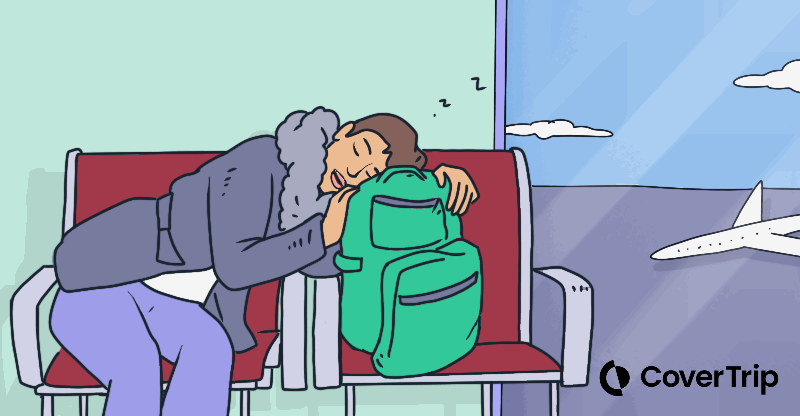How to take the stress out of flying often
15 November 2024
Many travelers around the world are heading into a heavy travel season: multiple holidays, winter school breaks, and the end of the year all combine to create a heavy travel season.
Many travelers who don’t travel often will be overwhelmed by the mental load it takes to plan and execute multiple trips over the next few months.
Business travelers and others who fly regularly for work or family have learned a routine that helps make their trips as efficient and stress-free as possible. As a leisure traveler, however, you may not have a strategy.
If you want to hack the travel process and gain frequent flyer zen, here are the expert tips you have to know.

Always pack light
What it means to pack light for one person isn’t always the same for another. Some travelers have situational handicaps—they travel with children or need to carry special equipment, for example. Some travelers simply have to have a full wardrobe available at all times.
Yet, there are so many reasons to pack as light as possible. You can walk longer distances, you save money and time, and, in general, you’re just safer and more in control.
There are so many ways to learn to pack light too!
- You can apply the 80/20 rule to packing.
- You can remember to leave these items at home.
Packing light means carrying:
- A single, carry-on bag per traveler
- And one other item (backpack, purse, etc.)
Packing light is a life skill that you can achieve! Here’s an article on how to become a one-bag traveler, complete with a packing list that works for everyone.
Always be (slightly) packed
When I traveled multiple times a month, I always kept a suitcase, toiletries bag, and travel health kit packed. I learned that investing in keeping duplicate items was worth the time because I had more time with family and wasn’t always hunting for and packing/re-packing the most common items I used every day.
When I returned from a trip, I unpacked the clothing and repacked the suitcase, put it in the closet and took the dirty clothes to the washer. Voila! I was done and ready to go again.
I used the same process for my backpack: duplicate chargers and a universal adapter in the backpack. With most of the work completed, I could quickly get ready for my next trip.
Create a checklist
If you aren’t a list person, this could feel weird, but you’ll save yourself a lot of time and mental energy.
Create two checklists:
- For your suitcase – see our packing checklist that works for everybody
- For your backpack/personal item
What goes in your backpack/personal item is the stuff you need during the flight:
- Wallet
- Passport (if needed)
- Techie things like phone, e-reader, tablet, headphone and chargers
- Basic meds and vitamins
- Snacks
- Reusable water bottle
- Sanitizing wipes (to keep your hands clean and germ-proof your seat area)
- Travel-sized toiletries (in case the flight is long or delayed): deodorant, toothbrush/paste, face cream, brush/comb, razor, etc.
- Scarf or travel blanket (bonus points if you wear it instead!)
Depending on how comfortable you are wearing the same clothes when you’re flight is unreasonably delayed, you may also want to pack a change of clothing.
If that doesn’t look like a lot – you’re right! That’s the point. Take what you absolutely need and, in most case, you’ll only have to buy something in an emergency.
Pro tip: Keep your travel backpack separate from your normal one, which may contain forgotten liquids or other items that could slow you down in security or be confiscated.
Dress for travel, not the trip
Sure, you may want to dress up on your cruise, but that jewelry and belt can only get in the way at security. Dress like you’re traveling and pack the things you want for your trip in your bag.
Even if you have expedited security programs, there are times when you may have to go through ‘normal’ security lines. Dressing comfortably and being prepared can help you get through all the lines much quicker.
Pro tip: Check out airport and security hacks for every traveler for more tips to speed through security.
Sign up for trusted traveler programs
Even if you’re not a frequent traveler, signing up for the trusted traveler programs can save you, especially in high-traffic travel seasons. These programs pre-approve travelers that are deemed low-risk so they can take advantage of expedited security processes.
Fact: According to the TSA, 99% of TSA PreCheck travelers wait less than 10 minutes in security lines.
Global Entry kiosks have been multiplying and are now available at many US airports for US travelers returning home. Travelers can now download the Global Entry app and skip the kiosks entirely.
Pro tip: While these programs aren’t free, it’s worth noting that lots of credit cards refund the application fee.
Get the right credit cards
When you travel for business, you can often collect the frequent flier miles for yourself, which can add to your ability to take trips for leisure. As a leisure traveler, you want to get the most out of your spending by earning points on the purchases you make on your trips.
Each airline has a loyalty program and credit card, but they’re not the only ones in the points game. Because the system of understanding points, miles, and credit cards for travel changes all the time, I refer to The Points Guy’s website for the latest information.
Stay healthy
One of the most important things you can do to relieve stress is to stay healthy, and this is never more true than when you have to travel a lot. Your body goes through a lot when you sit for long periods of time at high altitudes and cross time zones. The temptation to eat calorie-dense food is everywhere, especially during the holiday season when everyone seems to be trying to out-cook everyone else.
For starters:
- Pack a workout outfit and get your steps in every day.
- Try to choose healthy foods as much as you can.
- Drink plenty of water daily.
- Get quality rest as often as you can.
Pro tip: See Mastering the Art and Science of Sleep When You Travel for advice on that last point.
Download the travel apps
These days, we rely on our phones for so much and they’ve become essential travel buddies.
There are a number of travel apps that you should have to make sure your trips are as stress-free as possible, including:
- Airline app – for gate info, flight updates, access to entertainment and airport navigation
- Safer VPN – turns your phone into a safe virtual private network (VPN)
- Smart Traveler – when traveling outside the US
- GeoSure – for local safety conditions
- Ride-sharing app – to get a ride when you need it (choose the one that works in the locale where you’re traveling)
- Global Entry – when traveling outside the US (if you have the program)
In addition, to stay calm and peaceful, you may want a meditation or music app you can use.
Finally, nothing can mess with your travel plans, and your stress levels, like the weather. Be sure to read the very popular How to Check the Weather Before You Travel and bookmark it for when you return!
Related topics
Damian Tysdal is the founder of CoverTrip, and is a licensed agent for travel insurance (MA 1883287). He believes travel insurance should be easier to understand, and started the first travel insurance blog in 2006.
